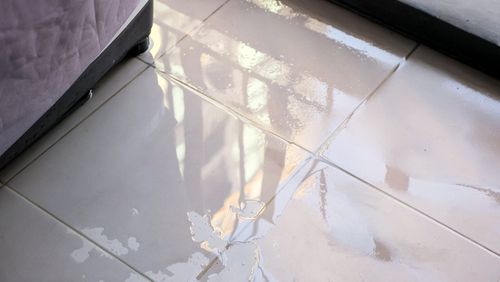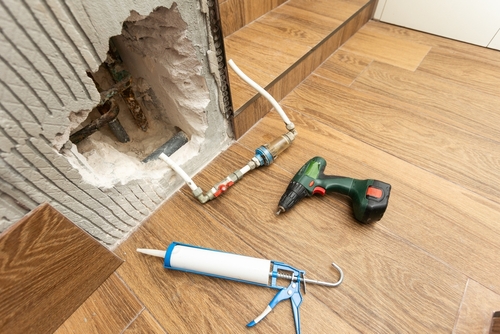February 28, 2025
7 Most Common Causes of Residential Slab Leaks
Slab leaks are a homeowner’s nightmare. They creep in silently, causing damage beneath the surface before you even realize there’s a problem. These leaks occur when the pipes running under the concrete foundation of your home develop cracks, holes, or outright breaks, leading to water seepage. Left unchecked, slab leaks can weaken the foundation, hike up water bills, and even create mold issues inside your home.
While slab leaks can happen in any home, certain factors make them more likely. Understanding the most common causes and turning to professionals in slab leak detection in Chula Vista without delay will help you catch issues early and prevent costly repairs. Let’s break down the top reasons slab leaks occur and how you can stay ahead of the problem.

What causes slab leaks?
Slab leaks can be a major headache, but knowing the common causes can help you stay one step ahead. Whether it’s corrosion, shifting soil, or poor installation, catching problems early can save you time, money, and stress in the long run. If you suspect a slab leak in your home, don’t wait—call a professional plumber to assess the situation and prevent further damage to your foundation.
1. Pipe corrosion
One of the most common culprits behind slab leaks is pipe corrosion. Older homes with copper or galvanized steel pipes are especially susceptible. Over time, the constant exposure to minerals in the soil and water can cause the pipes to corrode from the inside out. This process weakens the pipes, making them prone to leaks.
Homes in regions with high water acidity or alkalinity may experience premature pipe wear, increasing the risk of leaks. If your home is a few decades old and still has its original plumbing, it’s a good idea to have it inspected periodically.
2. Shifting soil & foundation movement
Your home’s foundation is constantly under stress due to natural soil expansion and contraction. Changes in moisture levels, seismic activity, or even poor soil compaction during construction can cause the ground beneath your home to shift. When the foundation moves, so do the pipes buried beneath it.
If the movement is significant, pipes can develop stress fractures or even separate at the joints, leading to leaks. This is particularly common in areas with clay-heavy soil, which expands when wet and shrinks when dry, putting extra strain on the foundation and the pipes.
3. High water pressure
High water pressure is great for many things, but it’s not so great for your pipes. When water pressure exceeds normal levels (typically above 60 PSI), it can strain your plumbing system, leading to wear and tear over time. Pipes beneath your slab are no exception.
The constant force of high-pressure water running through the pipes can cause them to weaken, particularly at bends and joints. If you’ve ever noticed banging or rattling sounds when turning off a faucet, it could be a sign that your water pressure is too high.
4. Abrasion from pipe movement
Water pipes naturally expand and contract as they heat and cool. When pipes are placed too close to hard surfaces—like the concrete foundation itself—this movement can lead to constant rubbing. Over time, the friction can wear down the pipe material, eventually creating pinhole leaks.
This type of damage often occurs in hot water lines, as they experience more expansion and contraction than cold water pipes. Insulating your pipes properly can reduce wear and extend their lifespan.
5. Poor workmanship or faulty installation
Sometimes, the issue starts from the very beginning. If the plumbing under your home was installed with low-quality materials or poor craftsmanship, leaks may develop much sooner than expected.
Common mistakes include:
- Improperly soldered joints that weaken over time
- Inadequate pipe supports that allow pipes to shift too much
- Substandard materials that corrode or degrade faster
If your home is relatively new but experiencing plumbing issues, it might be worth having a professional inspect the quality of the installation.
6. Tree root intrusion
While slab leaks are often associated with internal plumbing failures, external factors like tree roots can also play a role. Tree roots naturally seek out moisture and can infiltrate underground pipes through small cracks or weak points.
Once inside, they can grow and expand, creating significant damage and even causing complete pipe blockages. If you have large trees planted close to your home’s foundation, consider a routine plumbing inspection to ensure their roots aren’t causing hidden issues.
7. Aging pipes
No plumbing system lasts forever. As pipes age, they become more vulnerable to leaks due to wear and tear. The average lifespan of different pipe materials varies:
- Copper pipes: 50+ years (but prone to corrosion)
- Galvanized steel pipes: 20-50 years (high rust risk)
- PEX and PVC pipes: 40-50 years (more resistant to corrosion but still subject to deterioration over time)
If your home is older and hasn’t had its plumbing updated, it might be time to consider repiping to prevent future slab leaks.
Where can I find reliable specialists in slab leak detection in Chula Vista, CA & beyond?

If you’re having issues with a concrete slab and want an experienced professional to have a look, you should get in touch with Bob the Plumber. With a skilled and methodical team, attention to detail, and the latest in tools and technology, we bring vast on-field experience and efficiency. Our team will detect the telltale signs of a slab leak, use cutting-edge equipment to unearth the source of the leakage, and help you take all the crucial steps to avoid further damage.
We specialize in prompt, hassle-free interventions designed to minimize the damage and return your life to its normal flow with minimum disruption. All you have to do is give us a call as soon as you start suspecting something is wrong with your concrete slab and you’re free to spend time at Bayfront Park. We’ll waste no time arriving at your place and bringing back the comfort. Call us ASAP!
Related Articles
How Sewer Line Camera Inspections Work and Why You Need One
You’re in the bathroom, staring at the sink, wondering why the water just won’t drain. You’ve tried plunging, snaking, even …
What Can a Sewer Camera Really See? Common Issues Detected
If you’ve ever had a plumber visit and use a cable with a small camera to inspect your drain, you’ve …
Seven Crucial Steps When Repairing a Faulty Drainage
A faulty drainage system is more than just a nuisance — it’s a serious issue that can lead to water …
